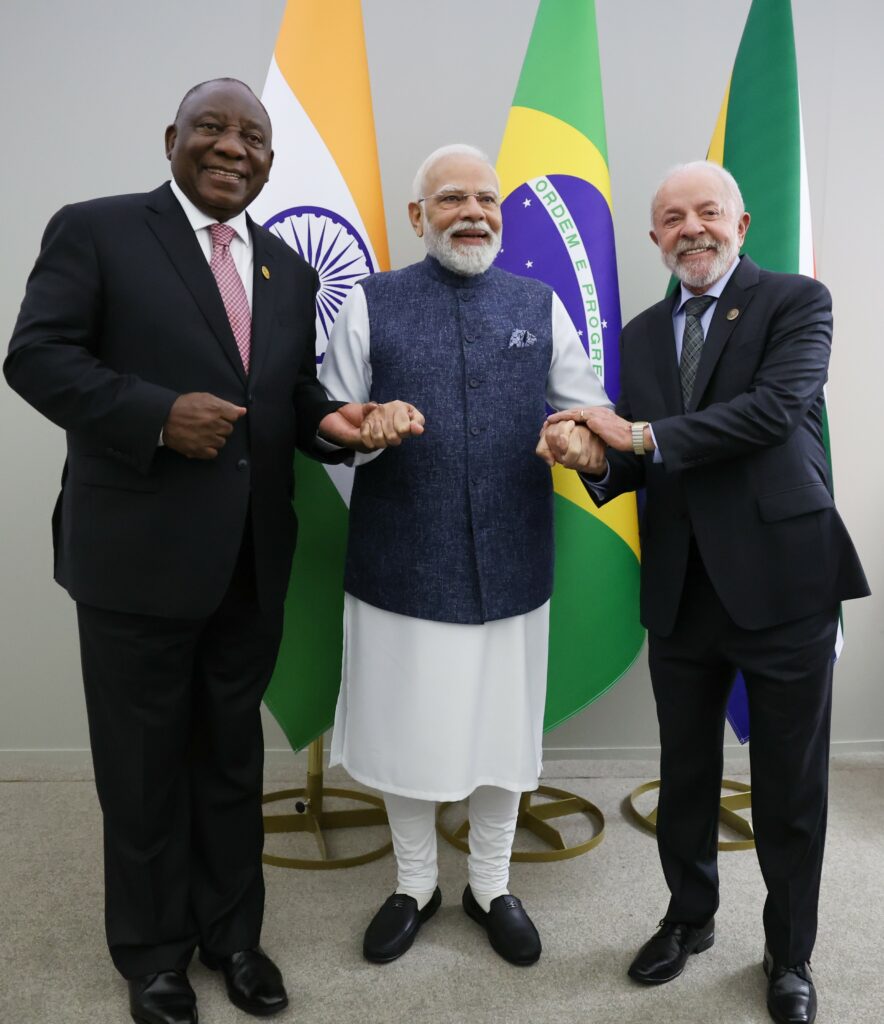
- The 6th IBSA Summit, held alongside the South Africa G20, reinforced the grouping’s role as a core platform of the Global South, with India, Brazil, and South Africa emphasising shared priorities such as sustainable development, multilateral reform, and democratic cooperation.
- India proposed new collaborative initiatives, including an IBSA Digital Innovation Alliance inspired by UPI and other digital public goods, while the three countries also discussed agriculture, sustainability, and key geopolitical developments, underscoring IBSA’s growing functional relevance.
- Intensifying U.S. pressure on all three IBSA members through tariffs, political accusations, and coercive diplomacy has pushed India, Brazil, and South Africa toward deeper coordination, strengthening their collective role within BRICS and balancing great-power influence.
An important G20 summit concluded in South Africa. Notably, it was the first G20 meeting held on African soil and the fourth consecutive G20 presidency led by a country from the Global South. The sequence began with Indonesia in 2022, followed by India in 2023, Brazil in 2024, and now South Africa this year.
This crucial G20 summit saw countries coming together to discuss major international agendas. One of the important issues discussed was the ongoing United States-proposed 28-point Ukrainian peace plan, which was taken up in a separate meeting among European Union members on the sidelines of the G20 to discuss it. However, the United States under President Trump chose to completely boycott the G20 summit in South Africa, alleging that South Africa is committing white genocide. This move added significant political tension to the summit.
However, among all the major developments of the G20, there was another important event taking place in the form of the India, Brazil, South Africa summit, known as the IBSA group. The 6th summit of IBSA was chaired by South African President Ramaphosa and attended by Indian Prime Minister Narendra Modi and Brazilian President Luiz Inácio Lula da Silva. The IBSA meeting was also held on the sidelines. IBSA is a grouping of India, Brazil, and South Africa, three important members of the Global South and BRICS, and also important members of the G20. These three countries share several commonalities in terms of development aspirations, employment opportunities, growth outlook, democratic values, and contemporary geopolitical challenges. Their cooperation lends the summit additional depth and relevance.
What Was Discussed At The Summit?
The IBSA summit agenda focused on sustainable development and multilateralism. Prime Minister Modi praised the grouping as three major nations connecting three major continents and three major aspiring economies. Modi also held a bilateral meeting with the South African President after the summit. During the IBSA session, Prime Minister Modi proposed an IBSA Digital Innovation Alliance for financial transactions inspired by platforms like UPI, as well as health platforms and human-centred AI. Modi invited the South African and Brazilian Presidents to attend the Digital Impact Summit to be held in India in February next year.
There were extensive discussions on agriculture, sustainability, and contemporary geopolitical developments. This summit cannot be ignored for several reasons. One common factor is that IBSA acts as a catalyst for stronger bilateral relations and greater understanding among the three countries. India has hosted two major Global South summits in the last three years, and Brazil and South Africa remain close partners. With all three countries often selectively targeted by Western countries, especially because of their strong roles in BRICS, cooperation becomes even more important. Their rise challenges G7 dominance and Western strategic influence, which naturally causes discomfort in Western capitals.
The Selective Targeting of the IBSA by the USA
The selective targeting of India, Brazil, and South Africa has intensified since the return of Donald J. Trump to the presidency. The United States has imposed a 50% tariff on many Indian exports and on a wide range of Brazilian goods. President Trump has also exerted economic pressure on Prime Minister Modi, including attempts to link his participation to the India-Pakistan ceasefire situation. Despite these pressures, Prime Minister Modi has not given in. Brazil also faces similar pressure tactics by Trump, with tariffs imposed not only for economic reasons but also because the Trump administration views judicial actions against former Brazilian President Bolsonaro as politically motivated. South Africa, too, has been targeted, with President Trump repeatedly accusing the government of committing genocide against whites and confiscating white owned land.
All three countries have rejected these accusations and refused to succumb to the US pressure. This selective targeting reflects a new form of neo-colonial mindset of the United States and a few Western countries, who still assume they have the authority to dictate terms to other sovereign nations. This has further pushed India, Brazil, and South Africa closer, and is also one reason why President Lula is expected to visit India next year.
The IBSA summit is important for overall economic prospects, the rise of the Global South, and the strengthening of BRICS. In recent years, BRICS has been portrayed as dominated by China and Russia. However, the presence of middle powers like India, South Africa, and Brazil ensures that BRICS remains balanced and not one-sided. It is beneficial for China and Russia as well to recognise that only a balanced internal structure can give BRICS the credibility and strategic weight needed to act as a counter to the West-led organisations.
Aayush Pal is a freelance writer on contemporary geopolitical developments. The views expressed in his work are entirely his own.
